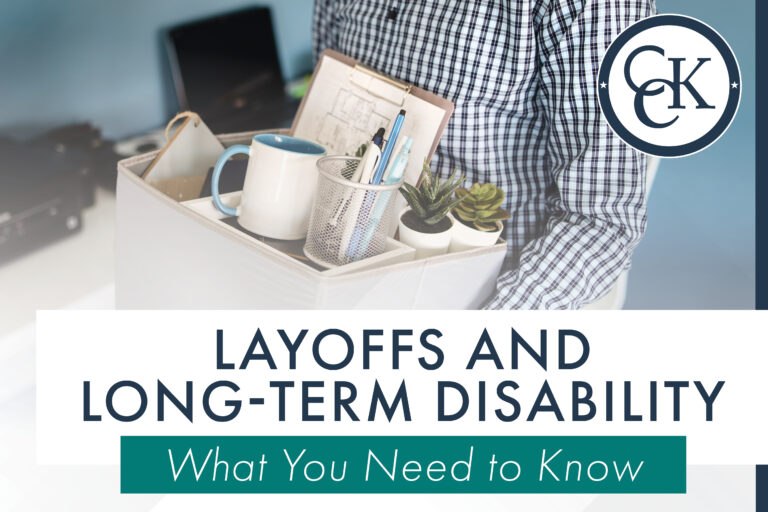Layoffs and Long-Term Disability: What You Need to Know

Layoffs are increasing across nearly every industry in 2025. Tens of thousands of workers faced sudden job losses in the first half of the year alone. Economic uncertainty and rapid advances in artificial intelligence are reshaping the U.S. labor market. This can be especially challenging for those dealing with serious medical conditions.
Today’s layoff trends are affecting individuals who rely on long-term disability (LTD) benefits, whether they are currently receiving them or may need them in the future.
In this article, CCK Law will explain:
- What happens to LTD coverage when a layoff occurs
- How individuals can prepare to protect their financial security
- And more
Current Layoff Trends in 2025
Professionals across the United States are facing challenging economic times, which have been impacted by the growing layoff trend in 2025.
To put this into perspective, in July 2025 alone, there were 1.8 million layoffs in the United States. Total layoffs—at the time of writing—for 2025 are currently at 12 million.
These numbers are significant, but why are they occurring? There are several factors leading to this surge of layoffs, including artificial intelligence (AI), automation, and economic pressures.
What Do Layoffs Mean for Long-Term Disability Benefits?
It can be overwhelming when an individual loses their employment, especially when they are dealing with a medical condition. If they were receiving long-term disability benefits at the time they lost their job, they may be unsure whether their benefits will continue.

Under most employer-provided LTD policies, if a person’s disability began while they were employed and had the LTD coverage, then their disability is still covered by the policy when they lose their job. Therefore, their benefits should continue.
Moreover, if a person loses their job before they have actually filed a claim for long-term disability benefits, they may still be able to file and be eligible to receive benefits, as long as their disability began while they were still employed and had the LTD coverage.
It is important for individuals to remember to always read their long-term disability insurance policy, which will include all relevant information needed to file a claim.
Potential Disruptions
While existing long-term disability benefits should continue even if a person loses their job, this does not mean that challenges won’t arise. For example, long-term disability coverage, and thus a person’s eligibility to file a new claim, typically ends when they lose their job (unless, as discussed above, they can prove their disability began before this date).
Even if a person can demonstrate that their disability started prior to losing their job, insurance companies may push back on claims filed after a layoff. Insurers may argue that coverage ended with employment, leading to a claim denial.
Additionally, if a person receives a severance package upon losing their job, these payments may offset their LTD benefits. Likewise, severance packages may require individuals to waive and release their rights to their long-term disability benefits, which can impact both a person with an existing claim and someone trying to file a new claim.
How Current and Future LTD Recipients Can Prepare
For those already receiving long-term disability benefits but have lost their job, there are a few things they can do:
- Maintain medical care: Explore COBRA or private health insurance alternatives to ensure continued access to medical care.
- Review severance agreements carefully: Obtain legal counsel before signing, since severance may affect benefit eligibility or result in benefit offsets.
For those who are still employed but are facing a layoff, there are also several things they can do:
- Know your policy: Understand LTD eligibility rules, effective dates, definition of disability, and coverage duration.
- Document health issues early: If you are struggling with health issues that are impacting your ability to work, make sure they are documented with your treatment providers to support a potential future claims.
- Build an emergency financial fund: Save enough money to cover premiums, lost income, and COBRA expenses.

Conclusion
Layoffs are rising in 2025, driven by AI, cost-cutting, and economic headwinds. But LTD benefits can persist post-job loss if properly timed and documented, but it is not necessarily guaranteed.
If you need help with your long-term disability claim or appeal, especially if you’ve lost your job, then Chisholm Chisholm & Kilpatrick may be able to help. For over 25 years, our team has helped LTD claimants and knows how to build a successful claim or appeal. Call us today at (800) 544-9144 for a free case evaluation with a member of our team.
About the Author
Share this Post
